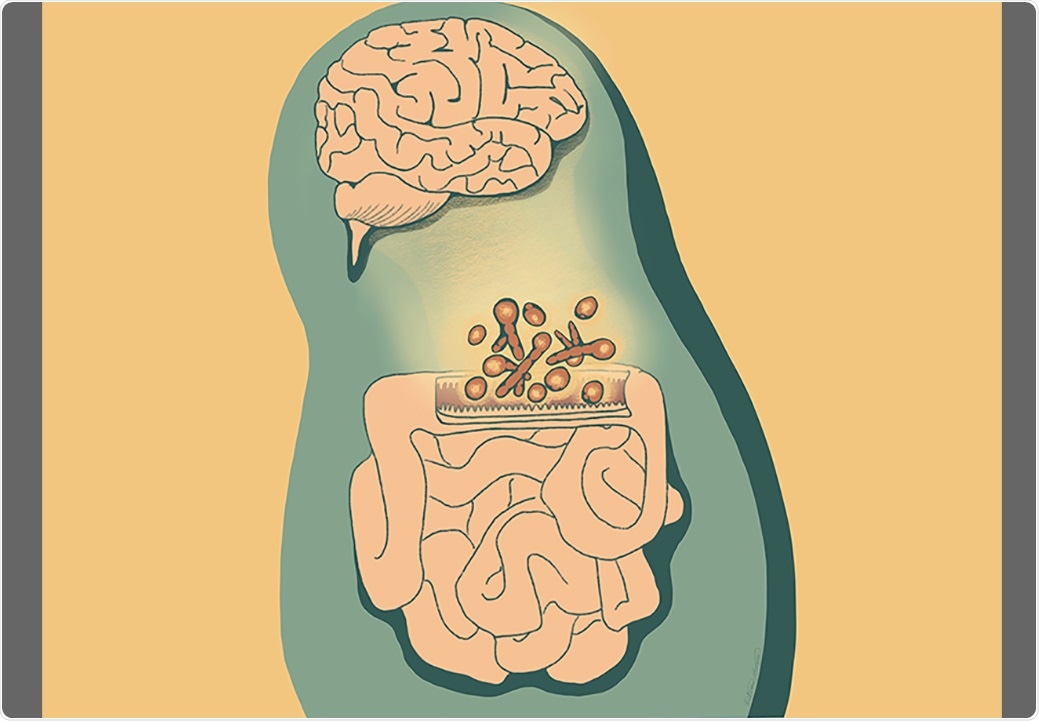According to a recent preclinical study from Weill Cornell Medicine, a certain species of fungus found in the intestines can protect against intestinal damage and alter social behavior.

Fungi in the intestinal mucosa induce immune signals (IL-17 cytokines) that impact the nervous system and animal behavior. Image Credit: Katarina Liberatore.
The findings add to a growing body of research pointing to a “gut-immunity-brain axis,” a communication pathway is driven not just by the body’s own cells but also by resident microorganisms, that might have a wide variety of consequences on physiology in both health and sickness.
The findings, which were published in the journal Cell on February 16th, 2022, show a unique set of chemical signals that connect gut fungus to their host cells throughout the body, including immune cells and neurons.
We have made a direct link between a major immune pathway induced by fungi in the lining of the intestine and signals in the nervous system that impact animal behavior.”
Dr Iliyan Iliev, Study Senior Author and Associate Professor, Immunology in Medicine, Division of Gastroenterology and Hepatology, Weill Cornell Medicine
Dr Iliyan Iliev is also a member of the Jill Roberts Institute for Research in Inflammatory Bowel Disease.
Other contributors are Drs Dilek Colak, Melanie Johncilla, and Megan Allen from Weill Cornell Medicine and Dr. Rhonda K. Yantiss from Weill Cornell Medicine and New York-Presbyterian.
The intestinal lining must strike a balance between absorbing water and nutrients from meals and functioning as a barrier to prevent the gut’s large population of bacteria from reaching the circulation.
The researchers used a mouse model to map the locations of different fungi within the intestine and discovered that a specific group of fungi tends to congregate near the gut epithelium, or lining, implying that these species have colonized the gut and interact closely with the epithelial cells nearby.
Mice infected with certain of these fungi were more resistant to events that can compromise the intestinal barrier, such as intestinal damage and bacterial infection.
There was fortification of those barrier functions when we added that specific fungal community to mice.”
Dr Iliyan Iliev, Study Senior Author and Associate Professor, Immunology in Medicine, Division of Gastroenterology and Hepatology, Weill Cornell Medicine
The fungus did not just improve the integrity of the intestinal barrier. The scientists discovered that mice with the fungal community in their stomach exhibited greater social behavior than mice without this fungus in separate trials.
Both effects appear to be caused by the animals’ own T cells, an immune cell type. T cells are induced to release two immunological signaling proteins, cytokines IL-22, and IL-17, by the fungus. Fungi-induced IL-22 strengthens the epithelium’s barrier function locally, whereas IL-17 penetrates the circulation and eventually reaches neurons with receptors. The social impacts of fungal colonization are absent in mice missing the IL-17 receptor in their brains.
“There is this harmony—a kind of communication between or across different types of organisms,” states Dr. Iliev.
The investigators are now hoping to delve further into that communication network.
We are trying to go deeper into the mechanisms of this interaction, looking at the signals that are involved at the neuronal level in different brain regions.”
Dr Irina Leonardi, Study Lead Author and Instructor, Immunology in Medicine, Jill Roberts Institute for Research in Inflammatory Bowel Disease
Dr Irina Leonardi is an instructor at Dr Iliev’s lab.
One interesting theory is that various gut microbial populations activate different parts of the brain and immune system, resulting in varied biological consequences on their hosts.
“This opens a whole new area to explore,” Dr Iliev concluded.
Source:
Journal reference:
Leonardi, I., et al. (2022) Mucosal fungi promote gut barrier function and social behavior via Type 17 immunity. Cell. doi.org/10.1016/j.cell.2022.01.017.